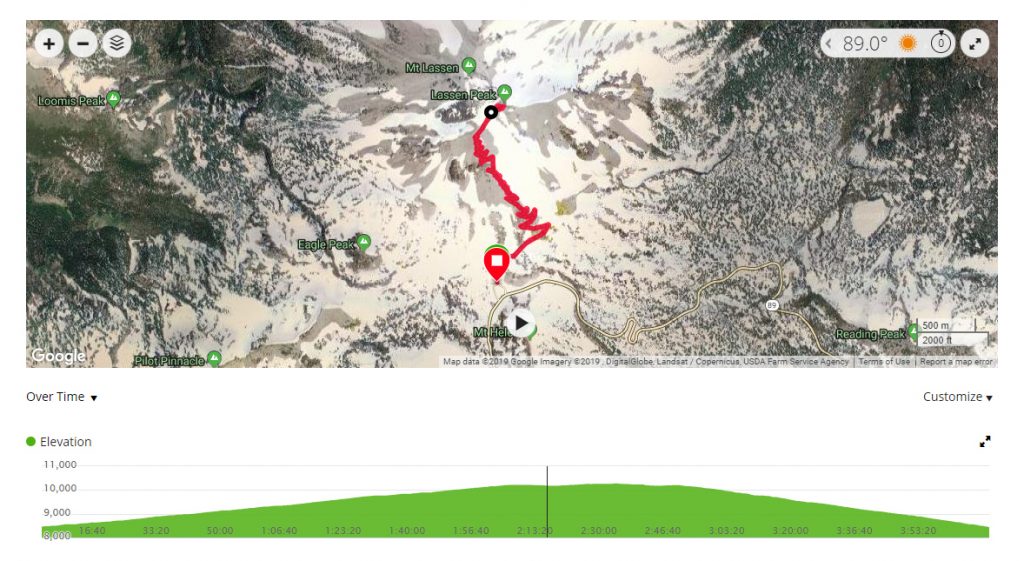Hiking Lassen Peak | Lassen Volcanic National Park

Written by Brian Callender | Photography by Julie Boyd

Lassen Volcanic National Park, and a hike to its namesake peak, has been at the top of our list of places to visit in California for quite some time. Julie and I toyed with the idea of going in 2017, but with the move, our wedding, and holiday travel, we knew it would be best saved for 2018.
Eager to visit, we kept an eye on the weather forecasts as the months past and summer fast approached. The park’s high elevation (up to 8,500′) means that it receives a heavy dose of snow during the winter months, and renders much of the park closed to vehicle traffic. When we drove by it in February, we were unable to go beyond Manzanita Lake near the park’s Northwest Entrance. With the conditions in our favor, we set our visit date for early July, ready to tackle Lassen Peak.
Hiking to Lassen Peak: Hike Details
Starting Elevation: 8,441 ft.
Distance: 5.60 miles, round trip (official distance is 5 miles, but we always ad-lib on our hikes)
Elevation Gain: 1,913 ft.
Hike Type: Out and back, day-hike
Difficulty Level: Strenuous
Date Hiked: July 13, 2018

Driving from Redding to Lassen Volcanic National Park

With an early start an essential part of our day, we left our home-base in Redding, the Comfort Inn, promptly on Friday morning and made the quick, 50-minute drive to the park. After a brief stop at the Loomis Museum to grab our passport stamp, we were back on the Volcanic Legacy Scenic Byway, making our way to the trailhead. From the museum, the highway winds through the park, and steadily gains in elevation during the 20-mile drive to the trailhead parking lot.
Hiking Lassen Peak

At 8,500, the trail to Lassen Peak is one of the higher starting elevations we have experienced to date. Coming from Redding, there wasn’t too much time to acclimatize before beginning our hike. Climbing just under 2,000 feet in 2.5 miles, it’s a steady trek to the top of Lassen Peak. Our goal was to be on the trail before noon, and we were on our way just after 10:30.

I stopped for a moment to read a sign at the outset of the hike that discusses trail cutting. There is a well-worn trail that at first glance almost looks to be the official trail, but it’s just off to the side and is clearly a man-made addition to the park. The sign essentially points out the damage to the landscape that going off trail has created, and the years it will take for the area to heal itself. It’s a sober reminder that we play an essential role in preserving these lands for ourselves and future generations. Oh, and if that isn’t enough, the park also says they will close the trail to self-guided tours and force everyone to take ranger led hikes to the peak instead, so there’s something else to keep in mind if you don’t think a decision you make will have an impact.

Back to the hike — The trail itself is entirely exposed, so bringing proper gear is essential. Julie and I both made sure to apply a liberal dose of sunscreen in addition to wearing hats to shade our faces from the sun. Hiking along, it’s clear to see that this is a landscape shaped by volcanic activity as the vegetation is sparse, and the soil is rocky.

At various increments along the hike, there are points of information that discuss the history of the park and it’s famous peak. It’s always nice to get a little background about the park, particularly one that is lesser known behind some of the more famous national parks in California.

As we began to near the summit, we started seeing an array of butterflies fluttering about the area. A bit higher up, there was yet another sign, this time explaining the migration of the California Tortoiseshell Butterfly. Brought in part by the strong winds that frequent the peak, and hungry for nearby nectar, the butterflies were prevalent throughout the latter part of our hike.

We made a short walk across a snowfield as we headed for the summit. The last portion of the hike is mostly a scramble over some rocks, boulder, and loose sand. Heading in the direction of other hikers, we found a spot to rest and enjoy the views.

.
While we had planned to stop and eat lunch at the summit, but the butterflies had become a nuisance, and I swore that I had seen some other bugs that I wasn’t eager to share a meal with. So we hiked back down and across the snowfield before finding a comfortable spot to enjoy our peanut butter and jelly sandwiches. On a clearer day, I’m certain the views would be incredible, but clouds prevented us from being able to far in any direction.

Before long, it was time to head back down the way we came. The return trip was an easy one and we passed loads of people on their way up the mountain. Since the weather had gotten a bit warmer, we were happy to be making our way in the opposite direction of many of the people. Back at the car, we unloaded our gear and said goodbye to Lassen Peak. A good hike and one we were both happy to check off our list.

Have you visited Lassen Volcanic National Park before? Let us know in the comments!
For more tips and inspiration from the Shasta Region, check out these posts:
A Chilly Winter Morning at Burney Falls
Shop Our Favorite Gear for this Adventure:
SAVE THIS POST FOR LATER
This post was in partnership with Visit Redding, all thoughts are our own












The pictures are beautiful and show how steep and rocky the area is. It is interesting to read the history of the area.
I have been to Lassen Peak several times, as I have a brother who lives on Lassen Mountain. It is a beautiful area and the lakes on the mountain are so clear and clean. I am happy that we have experienced the park before it has become too well known. It is so nice to have unspoiled vistas and surrounding forests. The view from the ranger station is incredible.
Thanks for sharing your experience, Sherry! It’s a beautiful place and we can’t wait to visit again soon.